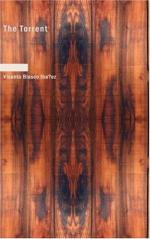“Yes,” the lady replied, curtly.
“Well, that’s strange. I have never seen you....”
“There’s nothing strange about that. I arrived only yesterday.”
“Just as I said!... I know everyone in the city. My name is Rafael Brull. I’m the son of don Ramon, who was mayor of Alcira many times.”
At last he had let it out! The poor fellow had been dying to reveal his name, tell who he was, pronounce that magic word so influential in the District, certain it would be the “Open Sesame” to that wonderful stranger’s grace! After that, perhaps, she would tell him who she was! But the lady commented on his declaration with an “Ah!” of cold indifference. She did not show that his name was even known to her, though she did sweep him with a rapid, scrutinizing, half-mocking glance that seemed to betray a hidden thought:
“Not bad-looking, but what a dunce!”
Rafael blushed, feeling he had made a false step in volunteering his name with the pompousness he would have used toward some bumpkin of the region.
A painful silence followed. Rafael was anxious to get out of his plight. That glacial indifference, that disdainful courtesy, which, without a trace of rudeness, still kept him at a distance, hurt his vanity to the quick. But since there was no stopping now, he ventured a second question:
“And are you thinking of remaining in Alcira very long?...”
Rafael thought the ground was giving way beneath his feet. Another glance from those green eyes! But, alas, this time it was cold and menacing, a livid flash of lightning refracted from a mirror of ice.
“I don’t know ...” she answered, with a deliberateness intended to accentuate unmistakable scorn. “I usually leave places the moment they begin to bore me.” And looking Rafael squarely in the face she added, with freezing formality, after a pause:
“Good afternoon, sir.”
Rafael was crushed. He saw her turn toward the doorway of the sanctuary and call her maid. Every step of hers, every movement of her proud figure, seemed to raise a barrier in front of him. He saw her bend affectionately over the sick orchard-woman, open a little pink bag that her maid handed her, and, rummaging about among some sparkling trinkets and embroidered handkerchiefs, draw out a hand filled with shining silver coins. She emptied the money into the apron of the astonished peasant girl, gave something as well to the recluse, who was no less astounded, and then, opening her red parasol, walked off, followed by her maid.
As she passed Rafael, she answered the doffing of his hat with a barely perceptible inclination of her head; and, without looking at him, started on her way down the stony mountain path.
The young man stood gazing after her through the pines and the cypresses as her proud athletic figure grew smaller in the distance.
The perfume of her presence seemed to linger about him when she had gone, obsessing him with the atmosphere of superiority and exotic elegance that emanated from her whole being.




